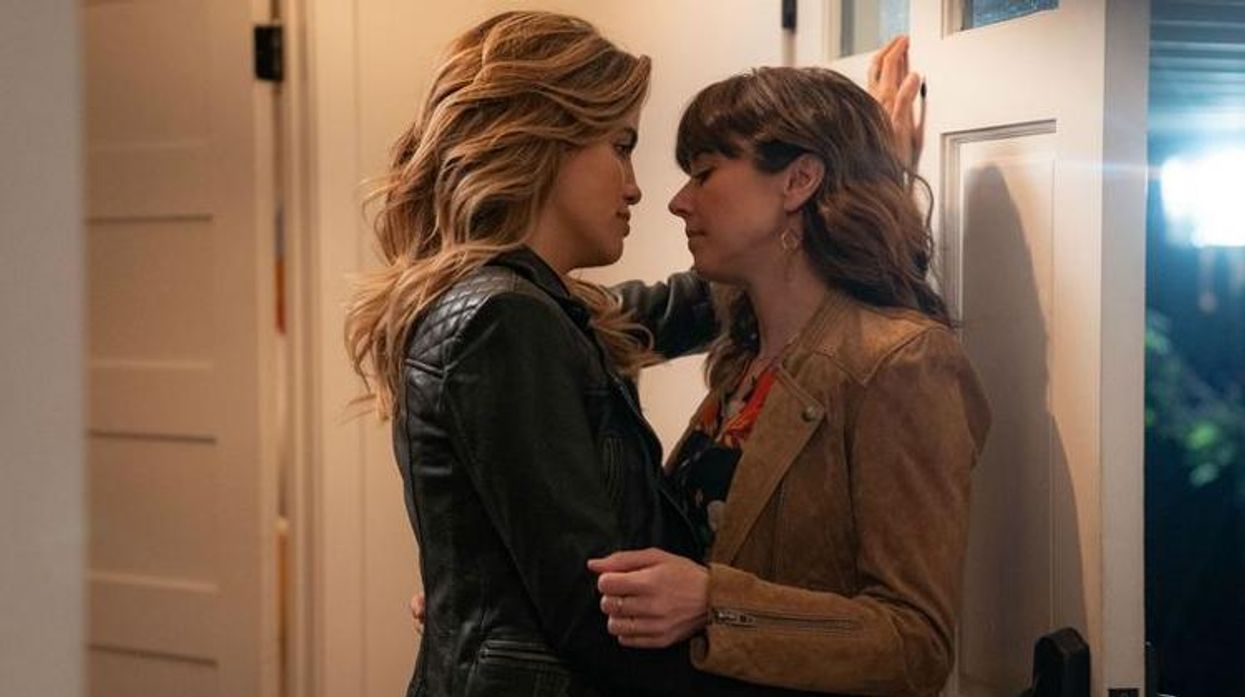Over the years, there have been a lot of television shows with queer characters that have had a profound impact on me. In high school, I came out to my grandma after Santana came out to hers on Glee, and remember telling my dad I liked girls after a conversation between Pretty Little Liars' Emily and Paige about the difficulty of dating someone who is closeted when you're out. In both of those cases, I knew what I was in for; these were shows that always had a a place for the experiences of queer people. But my latest binge, Dead to Me, had an unexpected gay twist that really resonated and mapped out what I want queer media to look like in the future.
Now streaming its second season on Netflix (and recently renewed for a third and final one), Dead to Me is a dark comedy created by out comedian and producer Liz Feldman. The 30-minute comedy stars Christina Applegate as Jen Harding and Linda Cardellini as Judy Hale, two women who meet at a grief support group. Jen is dealing with the loss of her husband to a car accident, and Judy says she's there because she lost her fiance to a heart attack.
Over the course of the first season, the show has some major twists and turns as well as mini-cliffhangers at the end of every episode. To my own dismay, season 1 wasn't explicitly queer, though Jen and Judy had some intimate emotional moments that have read as queer to some and Feldman has even acknowleged Jen and Judy's "kind of romance in a close friendship." But season 2 really turned up the queer heat, and I absolutely loved how Feldman handled it.
In the first episode of the second season, Judy meets Michelle (played by the openly queer Natalie Morales, whose coming out essay still makes me cry). After five episodes, Michelle and Judy have smoked weed together, engaged in some friendly banter that could be read as mild flirting, and have a conversation about their exes, which is probably the most gay thing two women can do. To my delight, by the end of the sixth episode, Judy pulls Michelle in for a smooch to the music of "I Think We're Alone Now," and before you know it, the two of them are waking up together in Michelle's bed.
What I loved so much about Judy's storyline is that her queerness is treated so nonchalantly. Judy kisses Michelle because she knows what she wants, and there is no hesitation to confirm that Judy is in fact into women. Moreover, Judy doesn't have a big coming out moment, and she is not defined by her sexuality. Instead, she just happens to be interested in dating both men and women.
For example, in episode six, Jen sees Judy with Michelle at an arcade, and simply says, "You like her," to which Judy responds: "I do." And when Judy returns to Jen's house the next day, Jen emphatically says: "You two are very cute together." There is no shocking confession that Judy also dates women or an intense set of questions about Judy's past dating experiences.
What's even better is how little Judy's sexuality seems to change Judy and Jen's friendship, despite the fact that Judy has been staying with Jen (and sleeping in her bed) for much of the last two seasons. As someone who struggled to come out to my straight friends in high school because I worried it would change the dynamic of our relationship and lead to questions about whether I had crushes on my friends, it was refreshing to see that Jen didn't make a big deal out of Judy's sexuality.
This sort of "casual queerness" is not very common on television, and is even rarer in movies. Thinking back to the queer storylines I encountered on television in high school and college, most of them treated coming out as a huge source of internal and external conflict. For example, in Netflix's One Day at a Time, Elena Alvarez struggles to tell her Cuban-American family that she likes girls. On a more intense note, other shows such as Nashville and Glee have shown characters who have attempted suicide because of their sexuality. While I can certainly relate to some of these conflicts and wholeheartedly believe that those kinds of storylines should exist given the struggles we as queer people face to come out in this heteronormative world, they can't be the only storylines out there. I commend Feldman for trying something new and portraying a character that has accepted her sexuality and is not questioned by her friends.
Dead to Me's handling of queerness in the second season is akin to the version of the world I hope we can get to one day, where some people are queer, and that doesn't have to be a conflict or an interrogation. Hell, maybe if we featured more of these storylines, this would become a self-fulfilling prophecy; LGBTQ youth would see that there is nothing wrong with being queer, and maybe, just maybe, feel a little bit more comfortable in their own skin.
Rebecca Damante is a freelance writer whose work has appeared in Tagg magazine. Follow her on Twitter @beccadamante.




































































Charlie Kirk DID say stoning gay people was the 'perfect law' — and these other heinous quotes